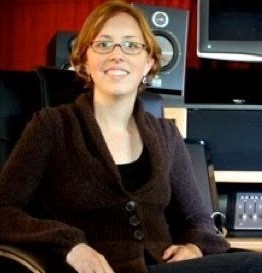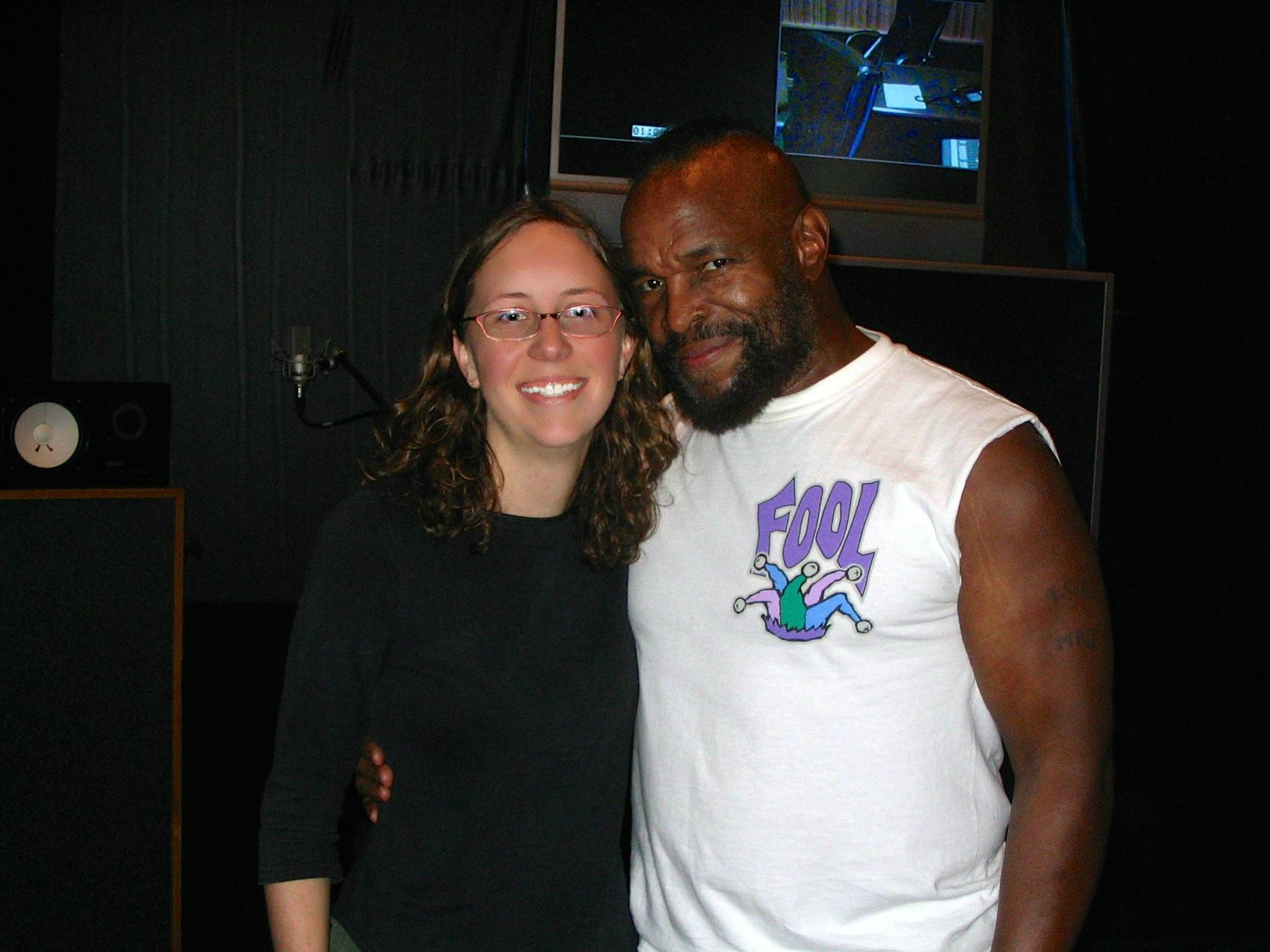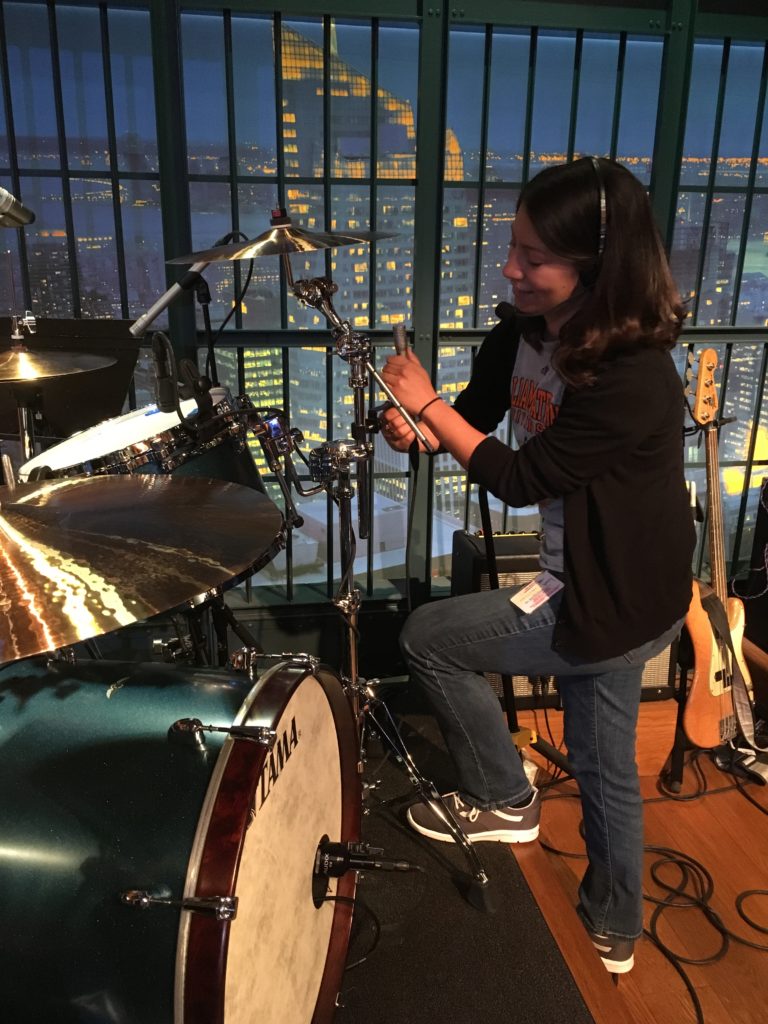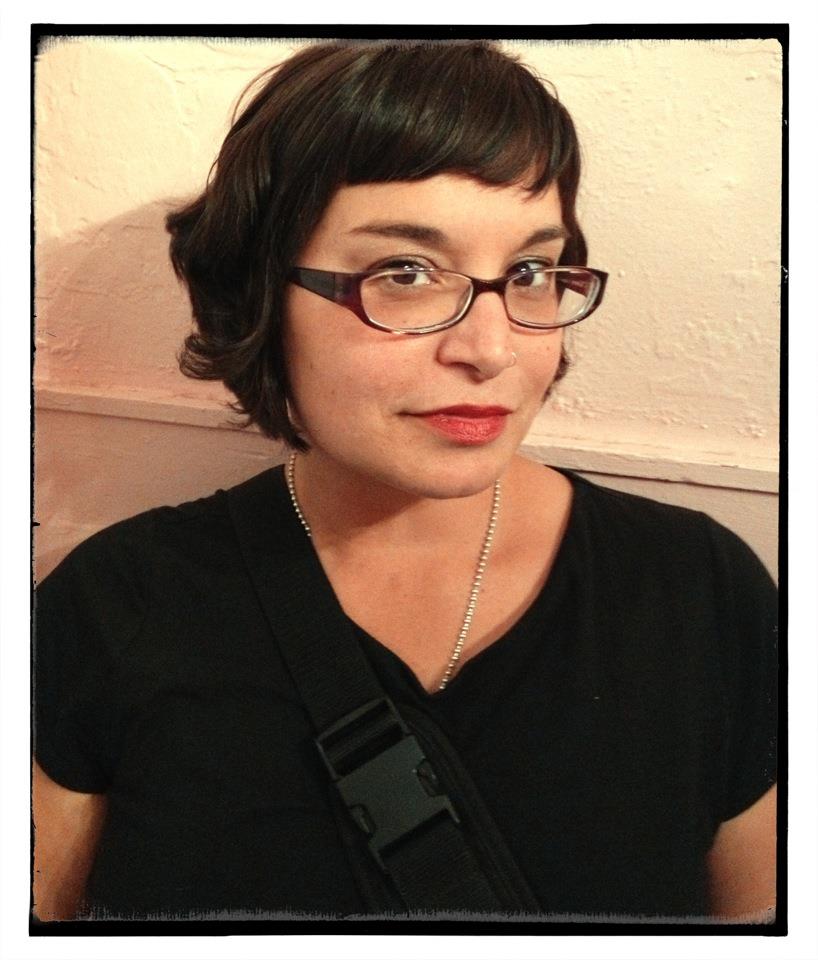By Karrie Keyes
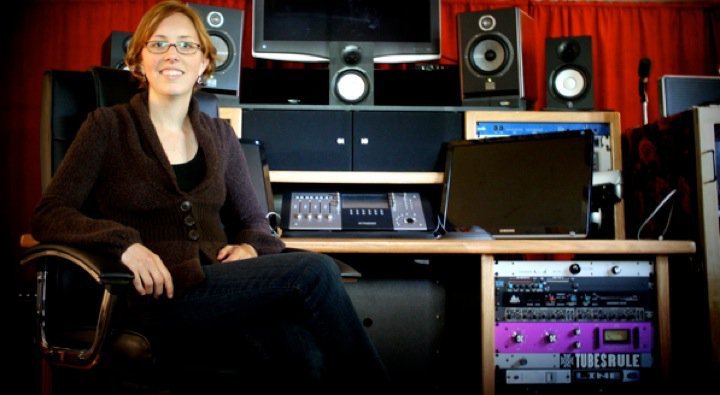 April Tucker is a re-recording mixer in post-production sound who currently works for FX Networks. She started her career in post-production in 2004 and has been doing freelance work since 2007. The road that led to post-production started in music recording. April received a Bachelor’s Degree in Music (Music Production and Technology) from the University of Hartford, and a Masters Degree in Music (Sound Recording) from McGill University in Montreal.
April Tucker is a re-recording mixer in post-production sound who currently works for FX Networks. She started her career in post-production in 2004 and has been doing freelance work since 2007. The road that led to post-production started in music recording. April received a Bachelor’s Degree in Music (Music Production and Technology) from the University of Hartford, and a Masters Degree in Music (Sound Recording) from McGill University in Montreal.
Even with six years of audio training, her first couple of years working in post-production felt like she was working on another degree. April was fortunate to be in an environment where she could sit in on a lot of sessions and observe professional mixers and engineers (re-recording mixers, ADR and Foley). While attending college, April worked in classical music where she recorded concerts and recitals and fell into doing sound reinforcement. April says that while she enjoyed learning the technology, she was pretty scared of live sound. “There was something about having everyone hear what I was doing (especially when there were problems) that really intimidated me.” Ironic as some of the television shows she has worked on average over ten million viewers.
When April moved to Los Angeles, she originally wanted to work on a scoring stage and was deterred by almost every music professional she met. Many cautioned against pursuing music production as a long-term career, and she was even advised by a scoring mixer to learn post. April had planned to learn post as a backup skill and to help pay the bills when she discovered it was a great fit. At the time, she was working a couple of part-time jobs, one of which was managing inventory of a recording studio that was going out of business. Through that, she got to know the new owners of the building (a post-production studio) who offered her an entry-level job before even seeing her resume. April believes it wasn’t a matter of being at the right place at the right time, but that she recognized an opportunity and took the initiative to make something happen with it.
Over the years, she has worked in a variety of roles from recording ADR and Foley for cartoons, editing, mixing reality tv shows (such as “The Bachelor” and “The Bachelorette”), sound supervising and mixing indie documentaries, and mixing internet content for Yahoo. At FX, she mixes for the marketing/promotional department, which creates a lot of “spots” you see during tv commercial breaks about upcoming episodes of TV shows. Her job involves a lot of sound editing, creative sound design, and mixing so the audio meets technical guidelines (called “specs”).
April occasionally gets to work on music projects, including being a score mixer (mixing an orchestra) for the Emmy-nominated PBS series “The Great Human Odyssey”. Through her freelance work, she gets to work with filmmakers, composers, sound and music studios, production companies, ad/marketing agencies, and other sound professionals.
April says understanding your signal path (and what each element does) is crucial in post-production mixing. “I know post mixers who use a compressor on a source channel, use heavier compression on an aux, and then slam the signal through a limiter on the master buss. When you hear a compression problem, where is it coming from? In live sound, if you are experiencing feedback, you don’t want to be going into three-channel strips to troubleshoot a problem. There just isn’t time for it. I prefer simplicity; I don’t apply any processing to my busses (outside of a broadcast limiter) unless it won’t drastically affect everything else.”
April believes that post and music are similar, in that you don’t need a lot of tools in your toolbox to get started. “It is more important to know how to use the tools you do have well. If you’re using the same equipment every day, whether it’s a console or a plugin in a template, you can learn to anticipate how audio will respond when you adjust settings. It’s not necessary to have lots of plugins to learn how to mix. It’d be like trying to learn to play guitar with 20 amps and 50 pedals. How much time would it take to test every combination to find out what sounds best, and how much time would that take away from learning how to play well? Work with what you have, learn to use it well, and upgrade as you find the need for it and the work to support it.”
For April, the variety in post-production is what she likes best. She can pursue work in ADR and Foley, sound editorial (dialog editing, sound design), and gets to do a lot of mixing (promos, TV shows, and movies). She is able to combine all those skills and work on a project from start to finish, which is often the case for indie projects. She says, “there’s a lot of creativity in sound (beyond music), and that was something I didn’t know before I worked in post.”
April found that while her education and skills in music production were applied differently in post-production, they were still relevant. She has found that there are a lot of people who started in music production and gravitated to post-production, so they have similar backgrounds and interests.
April’s favorite thing about working in post-production is the people. She says for the most part “Post-production audio people generally don’t have egos and are supportive of each other. I have experienced sexism at rare times, but I’ve also had the opposite. There are engineers and mixers that have treated me like a sister or a daughter, and I’ve worked for studios that felt like family.”
Another thing April loves about working at post-production studios is that there’s something unique or random happening every day. “Some days you might run into a famous actor or director in the hallway, or maybe paparazzi is causing problems outside, or someone’s cooking in the kitchen because they need to sample the sound. My job rarely feels like a job. It can be high stress and tight deadlines sometimes, but I like the challenge, the people are generally fun to be around, and there’s a story to tell every day.”
What she likes the least is that work schedule sometimes dictates life schedule. Television doesn’t stop for holidays. You have to be flexible as the schedule is always fluid. She also finds she works in the dark a lot, as in with no light. Mix stages are dark rooms without windows, and she finds she prefers working evening/night shifts, so she can spend her free time outside.
Obstacles that April faced when she was starting out include sexism, ageism, and life-work balance. She says that one boss told her that he could not put her on certain sessions because they did not want to work with a woman or someone so much younger than them. She says that while it was tough to hear, she appreciated his honesty.
She found that when she started out, she overextended herself by saying yes to everything. She has learned to turn down projects at times because of personal sacrifice or because she knew she would not able to deliver the quality of work that was expected. She says that while she is capable of working double shifts days in a row, “the quality and speed of my work goes down if my ears and mind don’t get enough rest.” While it is always hard to say no, she tries to remember that there will always be another opportunity. George Massenburg once told her, “It’s not a matter of finding opportunities, because you’ll have plenty of those. It’s choosing which ones you want to take.”
April learned early to drop any expectations for her career and found she was a lot happier because of it. “Like any business, I think we have to be flexible and aware of what the market actually needs (not just what we like to do) to be sustainable over time. With technology changing so quickly there are always new things to learn and new opportunities. I kind of like the mystery aspect of the future, actually. I’m happy as long as I’m learning new things, and I am surrounded by people who I enjoy and challenge me.”
For women just starting out, April offers this advice
Establish a comfort level and trust with the people you work with, and take the opportunities that you are offered. Then kick some butt. Pick your battles – Sometimes you’re better off just letting it go if someone isn’t treating you fairly. When my boss said certain people wouldn’t want to work with me, I just wanted to prove them wrong! What I wish I knew back then was that in the scheme of a 20+ year career, missing out on a couple of sessions really doesn’t matter.
Try to maintain a professional working relationship with everyone you meet, even if you don’t like them. You never know who will be your boss someday (or who you might be the boss of).
Be yourself. Just because all your co-workers show up in hoodies and talk about basketball doesn’t mean you need to dress down or start watching ESPN… unless you want to.
On Career Development
There’s a common misconception about the path to get a job: send out resumes, get called for an interview, get hired to a full-time job. The vast majority of jobs (and gigs) in this field don’t work that way. We are salespeople, selling ourselves and our services. It doesn’t matter if it’s music, post, production, or post-production. In addition to learning audio, it’s good to learn and practice sales and relationship-building skills. You can practice approaching people that you don’t know and introducing yourself. If you’re at a show, talk to the band afterward or the bartender. If you’re uncomfortable with that, you’ll probably be just as uncomfortable in an interview or with a client.
Always be open-minded to opportunities off the path, and have a backup plan or alternate source of income. It’s unfortunate to see talented and driven people quit the field because they were inflexible or went totally broke. They refused to do anything other than their dream job or got impatient that their dream job wasn’t coming their way fast enough. It takes time, experience and patience to get to where you want to be.
Must Have Skills
Personal: A sense of humor, ability to go with the flow
To work in film: Detail-oriented.
For TV/broadcast: Fast and efficient, ability to make quick decisions
The ability to work alone, but also perform in front of people under pressure
Technical Skills
Understanding signal flow and routing
A trained ear for EQ and eye for sync (which takes time – not learned overnight)
Fast at Protools and finding your way through sessions and templates. (A template is a session that already has plugins, auxes, routing, reverbs, plugins, VCAs, stems, etc.)
Strong understanding of film concepts like frame rates/timecode and video codecs, and basic film terminology
How audio gets in and out of Protools for post; AAFs, Stems/strong understanding of routing and what goes to a mix stage
Mixing: How to read a spec sheet and mix to audio specs
Automation. Learn to mix with faders
Favorite Gear
Plugins:
Audio Ease Altiverb – I use this for music and post.
Izotope RX – I use this every day. It’s a necessity for cleaning up dialog
Cedar DNS One – It’s the Rolls Royce of noise reduction.
Serato Pitch n Time – I do a lot of time compression (music, dialog, and sound fx), and this plugin you can really push without hearing artifacts.
When it comes to EQs, compressors, and de-essers, I’m pretty flexible. It’s not always my choice if I am working with someone else’s template, or at a studio that doesn’t have my go-tos. For my own gear, two plugins I’m really into now are FabFilter ProQ (EQ) and Waves MV2.
For monitors, I’ve been on Adam S3X for years at various facilities, which are great (especially if you have to mix long hours). At home, I use Focal Solo6. It’s rare for me to use a console – I’m usually on control surfaces.
 April plans to continue to work in post-production and would like to be able to share her knowledge with the audio community. Through outreach, she has discovered there are people all over the world learning and practicing the craft who have questions. “Being in Los Angeles, I’ve got a lot of support for advice, technical help, or even just grab a drink and vent about a tough day at work. Not everyone has that.”
April plans to continue to work in post-production and would like to be able to share her knowledge with the audio community. Through outreach, she has discovered there are people all over the world learning and practicing the craft who have questions. “Being in Los Angeles, I’ve got a lot of support for advice, technical help, or even just grab a drink and vent about a tough day at work. Not everyone has that.”
April has written some great articles about working in post-production and women in audio. You can find them at ProAudioGirl.Com. . You can check out her blog for SoundGirls.Org You can contact her at ProAudioGirl.Com
